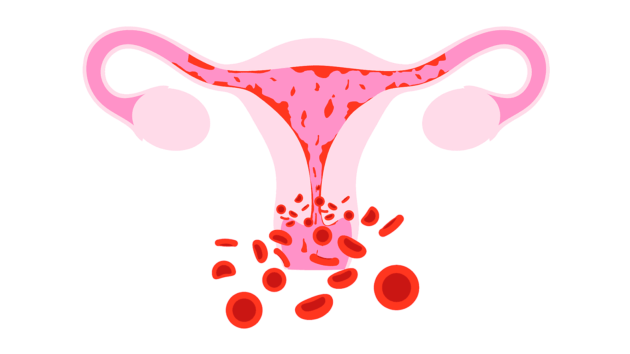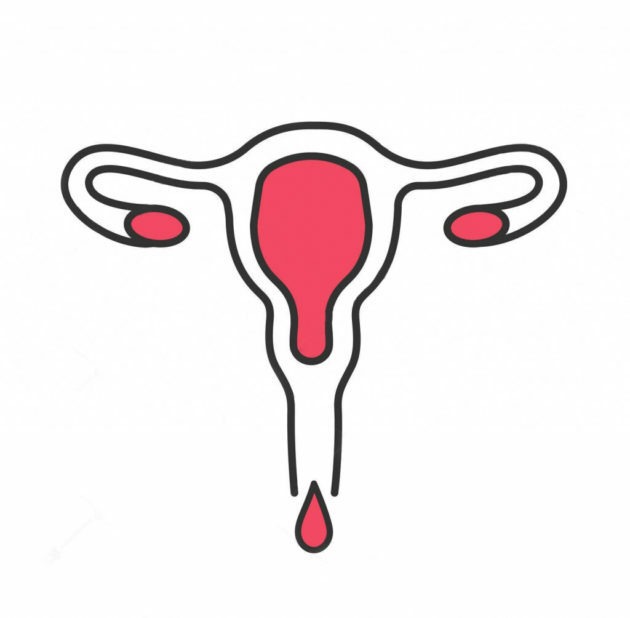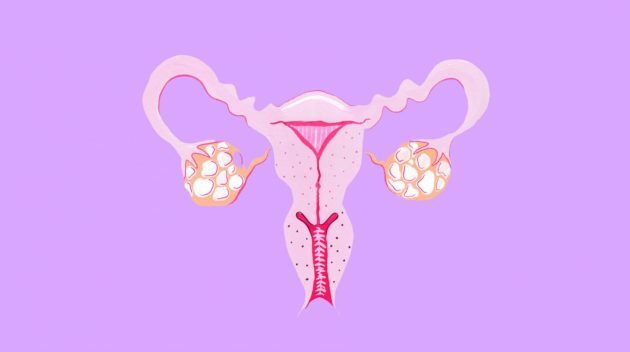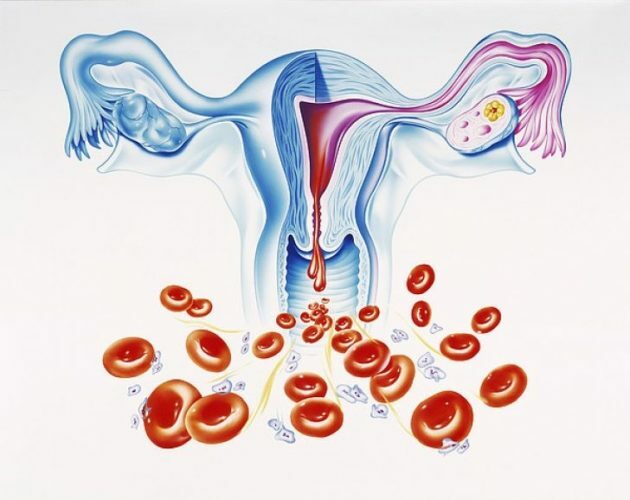Content
- 1 What is menorrhagia or hypermenorrhea in women in gynecology
- 2 Causes of menorrhagia in women
- 3 Menorrhagia symptoms
- 4 Diagnosis of menorrhagia
-
5 How to treat menorrhagia
- 5.1 Menorrhagia treatment in adolescents
- 6 Possible complications and consequences
- 7 Preventive measures
- 8 Conclusion
- 9 Reviews on the treatment of menorrhagia
Menorrhagia in women is expressed by too much blood loss during menstruation. The phenomenon cannot be considered as an independent diagnosis. Hypermenorrhea (the second name for bleeding) is often a consequence of pathological processes in the female body. Often, profuse menorrhagias indicate the presence of benign formations in the uterine cavity, for example, it may be a fibroid.
What is menorrhagia or hypermenorrhea in women in gynecology
The diagnosis of menorrhagia is a variant of the hypermenstrual syndrome, when the duration of bleeding is more than seven days. In this case, blood loss can be from 100 to 150 ml.
According to statistics, about 30% of women suffer from hypermenorrhea, but not all women turn to a doctor with this problem.
The phenomenon is of two types:
- Primary menorrhagia - occurs with the first menstruation in girls.
- Secondary - appears after an extended period of normal cycles.
The psychosomatics of menorrhagia lies in the fact that it significantly worsens the quality of life of patients, while affecting the performance and the normal course of sexual contacts. In addition, acute and chronic hypermenorrhea:
- cause anemia in the presence of iron deficiency;
- lead to exacerbation of chronic ailments.
Important! The ICD 10 menorrhagia code in adults is 92.

Acute type of menorrhagia, if the patient does not go to the doctor in time, can lead to the need for surgery
Causes of menorrhagia in women
Among the main causes of hypermenorrhea are:
- Imbalance in the hormonal system. Most often, menorrhagia occurs in women after 45 years of age. This is due to the instability of the hormonal background in the period before menopause.
- Any reproductive diseases. This includes fibroids, polyps, dysfunctions, adenomyosis, and other neoplasms that often cause menorrhagia in women 50 and older.
- The use of contraceptive drugs for intrauterine administration. Hypermenorrhea in this case can be considered as a result of the installation of the spiral, which requires its removal.
- Any diagnoses that are associated with a bleeding disorder, for example, thrombocytopenia. A high level of bleeding against the background of such a disease always causes menorrhagia.
- Increased physical activity, overwork, a sharp change in climate - all these factors force the body to adapt to new conditions. Additionally, this entails menorrhagia.
- Hereditary hypermenorrhea is a rare but common phenomenon that is transmitted through the female line.
- Diseases of other organs. In addition to fibroids and uterine ailments, menorrhagia occurs in diseases of the small pelvis, liver, kidneys, etc.
The main risk factors for heavy bleeding during menstruation are:
- sexually transmitted infections;
- stress;
- obesity, metabolic syndromes;
- hypertension;
- termination of pregnancy.
Important! Menorrhagia does not occur in all women with menopause. This should be facilitated by risk factors.

Hypermenorrhea in girls under 18 is usually caused by coagulopathy or adnexal insufficiency
Menorrhagia symptoms
The main symptom of menorrhagia is profuse bleeding, which does not correspond to the usual physiology. Additionally, blood clots may be present in them.
Violation of any of these criteria indicates the development of hypermenorrhea:
- the duration of menstrual bleeding does not exceed seven days;
- the frequency of menstruation - on average after 24-38 days;
- the total diameter of the clots in the discharge is not more than 2.5 cm;
- blood loss volume - no more than 70 ml;
- you have to change the gaskets no more than once every three hours;
- the volume of blood loss from cycle to cycle does not exceed a difference of 40%.

Menorrhagia should not be considered as a slight deviation from the norm, it may indicate serious pathologies in the body
Diagnosis of menorrhagia
Usually, the diagnosis of hypermenorrhea is made by interviewing a patient who complains of profuse bleeding. Clinical recommendations regarding menorrhagia consist in mandatory follow-up diagnosis, which will reveal the true cause of heavy blood loss. The main thing is to preliminarily exclude uterine bleeding during pregnancy, especially for the ectopic view.
Not the least important are the data of the anamnesis, in particular, whether the patient is taking any medications. This is followed by a mandatory examination of the vagina by a doctor, as well as a study of the cervical cavity. This will determine the presence or absence of foreign objects in the cavity, as well as damage that can lead to blood loss.
If, as a cause of hypermenorrhea, there is a suspicion of a pathology of the pelvic organs, the following studies should be carried out:
- Ultrasound of the pelvic organs;
- biopsy of the cervix;
- hysteroscopy;
- curettage followed by analysis of endometrial tissue.
Additionally, it is necessary to conduct a laboratory study of a biochemical blood test, study a coagulogram, also determine hormonal levels and test for tumor markers.
Attention! All women with confirmed menorrhagia are advised to keep a menstrual calendar to record the duration of bleeding, the frequency and amount of discharge. The latter parameter is easy to determine by the frequency of shim changes.
How to treat menorrhagia
Treatment of menorrhagia is carried out in two ways - therapeutically, with the help of drugs, and surgically, by surgery. The choice is determined depending on the nature of the hypermenorrhea.
Among the drugs, the following medications are prescribed without fail:
- Hormonal drugs. Long-term use of contraceptives is provided, which will allow you to adjust the balance. In the composition of such medicines, progesterone and estrogen are present, they help to stop the growth of the endometrium, which, in turn, reduces the amount of menstrual flow by almost half.
- Iron preparations, which will be a therapy against anemia.
- Rutin and ascorbic acid to reduce blood loss.
- Anti-inflammatory drugs (ibuprofen).
- Medicines that stop blood loss - Etamsylate, aminocaproic acid, etc.
Attention! If a hormonal disorder is present, therapy with homeopathic medicines is practiced.
Additionally, modern medicine practices the use of intrauterine systems with levonorgestrel. They also reduce the thickness of the endometrium, while also having a contraceptive effect.
As an additional recommendation, women with hypermenorrhea are advised to establish a regimen, providing themselves with normal sleep and nutrition. This will allow the body to recover quickly.

With hypermenorrhea, hysteroscopy is practiced in order to diagnose the state of the uterine cavity
Acute forms of hypermenorrhea require surgery. The indications are usually as follows:
- genital injury, physiological disorders;
- menorrhagia is recurrent;
- there is an obvious iron deficiency;
- if drug treatment is ineffective.
Warning! In difficult cases, hysterectomy is practiced - the surgical removal of the uterine cavity.
Menorrhagia treatment in adolescents
The main cause of hypermenorrhea in adolescents is an imbalance between estrogen and progesterone, which in turn affects the proliferation and rejection of the endometrium. In addition, profuse bleeding in girls with menarche is observed with infections of the genital tract, poor blood clotting, with an increase in the thyroid gland, etc.
Menorrhagia in adolescence is especially difficult to tolerate, therefore it requires compulsory medical intervention. Lack of timely treatment can lead to polycystic ovary disease.
Therapy includes iron supplements, low-dose hormones, and vitamin formulations.
Important! The effectiveness of the treatment of hypermenorrhea in adolescents is assessed six months after the therapy.
Possible complications and consequences
The most common complication of hypermenorrhea is the development of anemia. It occurs against the background of excessive blood loss in a short time or chronic bleeding. In addition, brittle nails, hair loss, deterioration of skin quality, and the appearance of dark circles under the eyes are indirect complications of menorrhagia. Excessive blood loss also affects performance, leading to dizziness and even frequent fainting.
Preventive measures
As preventive measures for hypermenorrhea, the following are considered effective:
- abstaining from unnecessary physical activity;
- lack of overwork, stress;
- avoid a sharp change in climate.
Additionally, it is recommended not to forget about regular examinations with a doctor, as well as ultrasound of the pelvic organs.
Additionally, as a preventive measure, it is recommended to drink vitamin complexes, including group B, C, as well as folic acid. Since bleeding is a medical emergency, it is recommended that you see your doctor right away.

To determine the risk of hypermenorrhea, you can use the regular maintenance of the menstrual calendar.
Conclusion
Menorrhagia in women is a phenomenon that requires mandatory medical intervention. Ignoring the problem can lead to sudden blood loss, which has a negative effect on the body. In addition, menorrhagia often indicates the presence of really serious pathologies in the body. Ignoring problems in adolescence can lead to further difficulties with conception.
Reviews on the treatment of menorrhagia
Elena Svintsova, 30 years old, Mirgorod
I always had very heavy periods, the pads were barely enough for two hours, I had to wake up often at night. My mother also suffered from the same problem, we both considered this to be the norm. However, recently I came to a good gynecologist who diagnosed me with hereditary menorrhagia. I drank hormonal drugs, the bleeding really became less profuse, the dizziness and weakness that often occurred during menstruation were gone.
Olga Potapova, 25 years old, Moscow
I have been suffering from hypermenorrhea since adolescence, nothing helped at all. I drank low-dose hormonal drugs, but they did not give an effect. Menses were always long and profuse. As a result, I had to agree to surgery - myoma was removed, which, as a result, became the cause of severe blood loss.
The information and materials on this site are provided for informational purposes only. You should not rely on information as a substitute for actual professional medical advice, assistance, or treatment.
